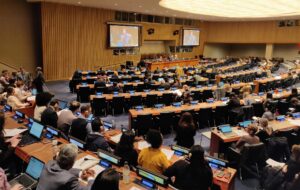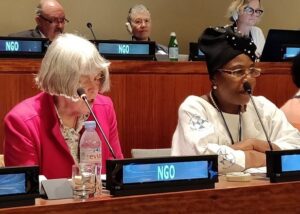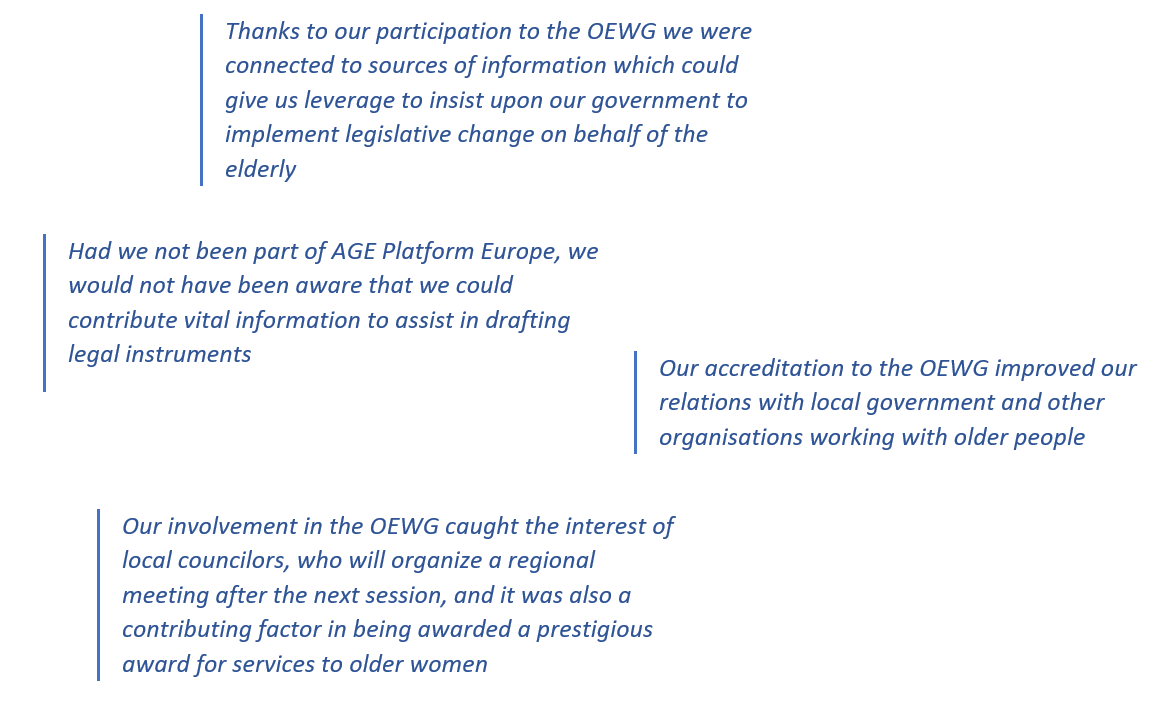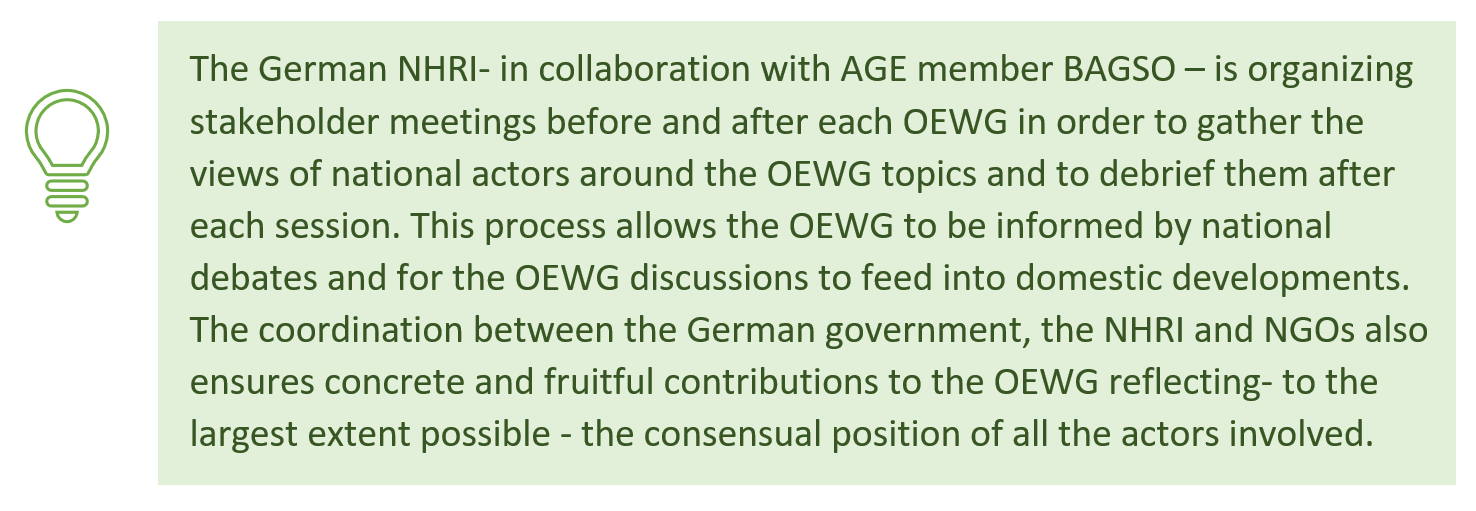
What is the Open-Ended Working Group on Ageing (OEWG)?
The Open-Ended Working Group on Ageing (OEWG) aims to discuss concrete ways to strengthen the protection of our human rights as we age. It is the only group in the United Nations (UN) that brings together Member States, National Human Rights Institutions (NHRIs), NGOs and UN agencies on this issue. It was established by the UN General Assembly in 2010.
Why is the OEWG important?
Human rights are universal. Human rights do not exist only for vulnerable individuals. They exist for all of us to make free choices and to live safe, happy and peaceful lives. They are a world recipe for living together and treating each other fairly.
Later life is part of life. The situations faced by many older people testify that barriers still get in the way of equally enjoying human rights in older age. Protecting our human rights in later life is indispensable in order to be recognised and supported as full members and valuable contributors to our societies as we age.
The OEWG discussions allow us to identify inequalities in law and in practice and explain what changes need to be made for human rights to become a reality in older age. They are critical to detect where the current human rights framework falls short in taking account of the unique context of older age, and where appropriate and effective measures are missing.
How does the OEWG work?

Every year the OEWG meets at the UN headquarters in New York. It considers problems older people face in accessing two areas of rights, for example: the right to autonomy or the right to housing. The year after discussing the gaps, the group considers the content of these rights, that is to say: how to define each right, and what measures States should take to realise it (the content of these rights is usually referred to as ‘normative elements’).

In advance of each OEWG session, States, NGOs and NHRIs are requested by the Chair of the OEWG to provide written information on the new areas of rights and recommendations for the normative elements of previously examined rights (usually referred to as ‘written input’).
Is the OEWG drafting a new convention?
No, at the moment the OEWG is not drafting a new convention (i.e. legally binding agreement of UN Member States). It does however aim to identify specific issues that may require further protection in a new convention. Although this idea is increasingly gaining traction as the preferred way forward, we need more governments to voice their support for a new treaty for the OEWG to start drafting and negotiating the text of a new convention.

Click here to read our position

What is the role of NGOs at the OEWG?
NGOs have a crucial role to play in bringing forward the views of older persons they represent and counterbalancing the perspective of Member States. Older persons, as self-advocates, should have the opportunity to take the floor to present the contexts in which their rights are denied and how they think they could be better protected.
> How to participate?
In order to attend the sessions, you need to be accredited to the OEWG. The accreditation process is very simple but only opens once a year, a few months before the OEWG session. Relevant information is posted on the website of the OEWG.

> Who is participating from AGE?
AGE has been taking part in sessions of the OEWG since 2012. In addition to AGE, 17 of our members have also been accredited to the OEWG. Their testimonies illustrate the added value of involving national NGOs both for the global debate, but also for advocacy work at national and local level.

> What if I cannot travel to New York?
There are plenty of things you can do even if you cannot physically attend the meetings.
- You can follow remotely all the sessions through the UN web tv.
- All accredited organisations can submit written input both for the new topics discussed by the OEWG and the normative elements of previously explored rights.
- You can encourage your government to participate in the OEWG and to reply to the Chair’s call for written input. You can also ensure that their position is informed by the views of older people: EU Member States have repeatedly agreed that they will consult with older people and take due account of their opinion.

Have a look at our briefing! Helpage international has also developed the FAIR Guidelines for civil society organizations wishing to influence government positions around the OEWG and the need for a new convention.
- You can organize meetings with your government, but also with your National Human Rights Institution (NHRI), Equality Bodies and other Civil Society Organisations (CSOs) to discuss the topics of the OEWG and how they are addressed at national level ahead and after the session in New York.

- You can join the Global Alliance for the Rights of Older Persons (GAROP) and become part of the global movement calling for a new UN convention to strengthen the protection of our human rights when we become older.
What has AGE done at the OEWG so far?
Our work at the OEWG is part of our wider effort to protect our human rights in older age. Our work in Europe builds links with international processes that focus on the rights of older persons, within the Council of Europe (CoE) and the United Nations (UN) to ensure that they take into account the views of older people in all international instances where the EU is represented.
Retrieve our submissions and reports of the OEWG sessions below:
2020/2021 Written inputs
2019 Written inputs | Report
2018 Report | 2017 Report | 2016 Report
Where can we find more information?
- Website of the UN OEWG
- Older persons’ self-advocacy handbook (includes a chapter on the UN and a section on the OEWG)
- Summaries of the OEWG sessions by the Global Alliance for the rights of older persons (GAROP)
> Useful resources
- HelpAge FAIR guidelines to garner governments’ support for a new convention
- AGE briefing on action at national level to support a UN convention
- GAROP guidelines for NGOs national advocacy, substantive discussion and oral statements at the OEWG
- GAROP Frequently asked questions on strengthening the rights of older persons worldwide.
Contact




